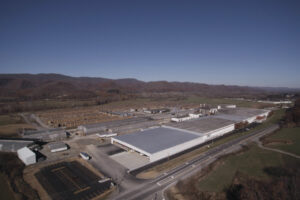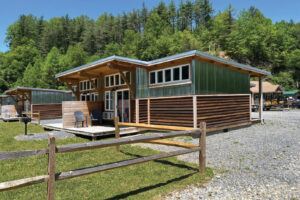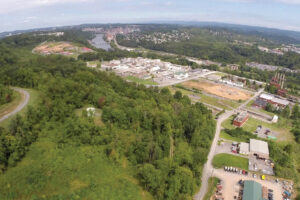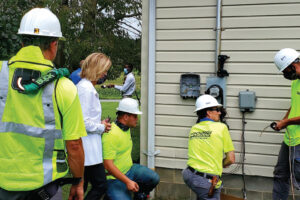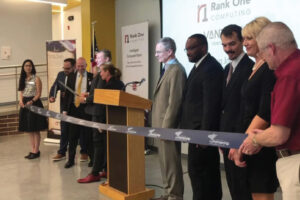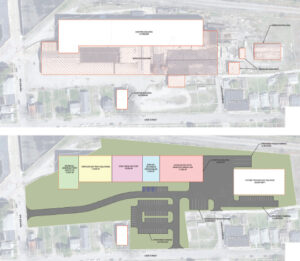Public-Private Partnerships
By Anna Moore
When a public sector joins a private sector in partnership to fund a service or project that is typically offered by the public sector, you have a public-private partnership (PPP). Oftentimes, PPPs can be wise solutions for getting the capital needed to fund a particular concept-turned-project or to upgrade an existing entity in need of maintenance. The World Bank says PPPs can help foster new solutions and bring finances to governments facing aging or a lack of efficient infrastructure. By working together, public and private sectors make the dream become a reality, without the financial burden.
There are many PPPs in the state of West Virginia that have proven successful, including various business ventures, infrastructure improvements and recreational destinations.
West Virginia Executive reached out to some projects across the state that are either already funded or have funding in progress through PPPs. These PPPs range from small to large scale and prove just how effective these types of partnerships can be in the broader economy in West Virginia.
AHF Products
By Robbie Morris, Randolph County Development Authority Executive Director
The AHF Products plant in Beverly, WV, is the largest pre-finished hardwood flooring plant in North America with approximately 835,000 square feet under one roof. AHF employs over 500 people directly, with hundreds of additional jobs being tied to the plant indirectly through logging, sawmills, trucking and more. All these reasons made it a simple decision for the Randolph County Development Authority (RCDA) to partner with AHF when it needed to expand its current plant by 85,000 square feet to create a distribution center and additional warehouse space.
As property owner of the AHF plant, the RCDA applied for a U.S. Economic Development Administration (EDA) grant to help expand the facility. The U.S. EDA awarded a $2.5 million grant to the RCDA to help with construction costs. The RCDA was able to leverage the remaining private capital necessary for the $9.2 million total project from AHF. The expansion allowed the Beverly plant to update the way it fulfills orders to customers. The flexibility created by the distribution center reduced costs for the company, while allowing AHF to meet customer expectations. The extra space also allowed for a larger warehouse to keep more products in stock while freeing up area for more manufacturing capabilities.
Without the grant from the U.S. EDA, this expansion project would not have been financially feasible. The partnership between AHF and the RCDA is what made the grant possible. A solid team effort between public and private entities resulted in creating jobs, growing the economy and contributing to the success of the overall community. This is a prime example of how PPPs are supposed to work.
ATV TrailCamp at Coaldale
By Roger Earle, West Virginia Department of Environmental Protection Engineer
The ATV TrailCamp at Coaldale in Mercer County is an excellent example of the joint efforts between public and private investment. Working with the Mercer County Development Authority, B&O Development, LLC, owned by local architect Todd Boggess and based in Princeton, WV, applied for and received a grant through the West Virginia Department of Environmental Protection’s (DEP) Abandoned Mine Lands Economic Revitalization (AMLER) Program. The property was listed as an abandoned mine property, and the highwall is clearly visible. The AMLER Program encourages private development of property in order to improve economic opportunities throughout the state, as well as to correct any existing conditions that could be hazardous to the public that were caused by coal mining activity that occurred on-site before the Surface Mining Control and Reclamation Act of 1977.
Construction started in summer 2020, and after some delays due to COVID-19, it was substantially complete in January 2023. The ATV TrailCamp is now open and is a welcome addition to the lodging options available for ATV trail riders in Southern West Virginia. The ATV TrailCamp consists of four duplex units, or eight cabins, with one to two bedrooms each. The AMLER Program funded the new cabin construction, some site improvements and the sanitary system for the development. The renovations to an existing house that sleeps 11 were paid for with private money. There is also a large metal building that has renovation plans for the near future. Possible uses may include ATV rentals, storage/repair, a general store and/or a restaurant. Plans also include offering RV hook-ups and construction of additional cabins.
The coordinated efforts of the Mercer County Development Authority, Mercer County Commission, DEP and B&O Development, LLC have all contributed to the success of the project. Private investment dollars are being worked through a local bank, New Peoples Bank, along with support through community partners and a loan from the West Virginia Economic Development Authority.
Claudia L. Workman Wildlife Education Center
By Diana Kile Green, Forks of Coal State Natural Area Foundation Treasurer
The Claudia L. Workman Wildlife Education Center began with a $1.5 million gift of property by the late businessman Jack Workman to the West Virginia Division of Natural Resources (DNR). Jack and Claudia Workman were inventors and successful business partners. Claudia was a philanthropist dedicated to promoting literacy, learning opportunities and wildlife conservation to children and the community. After her passing in 2014, Jack donated the property with the stipulation that a nature center be built in her memory.
As part of the donation agreement, a nonprofit foundation was established—the Forks of Coal State Natural Area Foundation—creating a PPP. The DNR provided $6 million in funding for the building and the foundation contributed exhibits valued at nearly $1 million.
The foundation received a U.S. Office of Surface Mining Reclamation and Enforcement (OSMRE) grant through the DEP’s Office of Abandoned Mine Lands and Reclamation. These grants are awarded annually to support economic redevelopment in historic coal mining areas. The Workman property at the Forks of Coal River has several small, abandoned coal mines on it. Officials from several counties supported the application, and additional funding came from local businesses and other nonprofits.
The center houses interactive exhibits that illustrate the DNR’s work in wildlife habitat management and restoring native animals in their original habitats. Visitors view a 1,500-gallon aquarium with native Coal River fish, live reptiles, an active beehive and an interactive observation area for bird watching. Wall panels present American Indian history in the area, conservation heroes, stream restoration projects and more. An amphitheater is located behind the building.
The center staff works for the West Virginia State University Extension Service through a cooperative partnership with the DNR. In addition, a VISTA/AmeriCorps worker is sponsored by the foundation, the OSMRE and the DNR. The foundation is funding additional exhibits, while its members assist in activities, maintain trails and lead hikes. Schools from the region bring students to the center. This collaboration has achieved Claudia’s dream of creating unique learning opportunities for students and families.
Morgantown Industrial Park
By Mary Lemine, The Thrasher Group, Inc. Marketing Manager
Build it and they will come. No truer statement could be made about the Morgantown Industrial Park (MIP). Acquired by Enrout Properties in 2006, the MIP has become a destination for economic development projects. The centerpiece is the 330,000-square-foot manufacturing facility occupied by Mountaintop Beverage. While it may be the most talked about piece of the park, it’s not a standalone operation—SI Group, Penske Trucking, Mon County Solid Waste Authority and Central Supply Company, amongst others, all call the MIP home, with more on their way to doing so soon. How did this more than 500-acre site go from sparsely populated to one of the area’s main economic drivers? They are the direct result of PPPs.
It started with Enrout’s vision and an MIP master plan designed by The Thrasher Group. The two collaborated to develop a variety of shovel-ready pads to attract businesses of all sizes, with coordination between the Morgantown Utility Board, First Energy and Dominion Resources to ensure the right utilities were in place. Meanwhile, work behind the scenes with the Morgantown Area Partnership, Monongalia County Commission, West Virginia Division of Highways and West Virginia Department of Economic Development brought on a slew of additional opportunities. Whether establishing the MIP as a Tax Increment Financing District, planning a new interstate interchange, securing a U.S. EPA Brownfields Cleanup Grant or facilitating construction of a new MECCA 911 Center, each entity has played an invaluable part in moving the MIP forward.
Juggling so many moving pieces required a strong team on all sides and a highly coordinated effort. Enrout has deftly led the charge, bringing a clear vision and a passion for making it happen. Thrasher has also been a common thread through the MIP’s development. Putting its master plan to action, Thrasher has handled mass earthwork design, roadway realignments, utility extensions, architectural design and more to help the MIP blossom into a leading development for West Virginia.
North Preston Broadband Connect
By Robbie Baylor, Preston County Economic Development Authority Executive Director,
and Tim Wotring, Prodigi President and CEO
The North Preston Broadband Connect project was undertaken through a partnership between the Preston County Economic Development Authority (PCEDA) and Prodigi, a local broadband provider. This partnership was formed to apply for U.S. Department of Agriculture (USDA) Community Connect grant funds to provide fiber broadband service to northern Preston County. The PPP model formed was supported by the Federal Communications Commission (FCC). The FCC encouraged public-private initiatives and using partnerships to apply for existing federal funds. The $3 million USDA grant for this project was awarded to the PCEDA on December 9, 2019. Prodigi and the PCEDA partnered to provide the required $450,000 matching funds.
Both the PCEDA and Prodigi relied on their strengths to make this project successful. The PCEDA handled the grant and funding management, which allowed Prodigi to focus on building fiber and providing broadband connections. The partnership also brought increased financial resources
to the project. Finally, because the PCEDA is a public body, there was transparency on all aspects of the project.
The project was completed in November 2022. Through the partnership, 111.8 miles of fiber broadband were built to serve customers who either had no service or limited service prior to the project. The project passed by 1,337 households, and at the end of the project, 871 residents had signed up for service and Prodigi was still receiving new requests for connection.
At the time the project was funded, the PCEDA and Prodigi had no idea how important broadband connectivity would become to everyone in just a few months with the arrival of COVID-19. Through their working relationship and collaboration, they were able to complete the project on time and on budget during the pandemic and build more miles of fiber and pass more households than originally
estimated with the funds available. Because of this success, the organizations have gone on to partner on additional broadband projects for Preston County.
Rank One Computing
By Allison Rowe, Rank One Computing Director of Integrated Marketing
In July 2022, Rank One Computing (ROC.ai) expanded from its headquarters in Denver, CO, to its new East Coast hub in Morgantown, WV, through a close partnership with local innovation champion, Vantage Ventures.
With unwavering commitments to elevating the state’s cybersecurity landscape, the two organizations share a similar vision for transformative progress. Vantage Ventures powers the growth of impactful technology and entrepreneurs in West Virginia, while ROC.ai leverages computer vision technology to improve safety and security across the country and around the world.
Together, ROC.ai and Vantage are spearheading a groundbreaking pilot program to enhance safety in public schools. ROC Watch—the organization’s state-of-the-art live video analytics platform—enables existing security camera systems to automatically detect unapproved visitors and alert administrators or authorities to take action. The platform can also identify people, objects, weapons, license plates, fingerprints and more. In less than a year, the pilot has already launched in more than 50 schools across four West Virginia school districts.
The ribbon-cutting ceremony for ROC’s West Virginia office was attended by distinguished guests from the offices of the state’s U.S. Senators Shelley Moore Capito and Joe Manchin, as well as West Virginia University President Gordon Gee.
“As a West Virginia native, it’s been a lifelong goal of mine to grow a vibrant technology sector in the state,” says CEO Scott Swann.
Vantage Ventures Executive Director Sarah Biller agrees that ROC’s decision to open a new office in West Virginia is emblematic of the company’s commitment to bringing impactful technology and entrepreneurs to West Virginia.
The partnership stands as a testament to driving impactful innovation in West Virginia. By combining expertise and resources, these visionary organizations aim to cultivate a thriving ecosystem and propel the state forward.
Williams Lea
By Valerie Piko, Regional Economic Development Partnership Program Development Manager
Paris, London, Dublin, New York, Tokyo, Melbourne and Wheeling. Wheeling, WV, may seem out of place on a list like this, but Williams Lea, a leader throughout the world in back-office support, has operating locations in large, prominent cities all over the globe and has been fortunate to call Wheeling home for the past 17 years.
After Orrick, an international law firm, located its global operations center in Wheeling in 2002, the team at Regional Economic Development Partnership (RED) and the City of Wheeling set their sights on the next project. Working off their success, with the major employer of back-office support, they recruited Williams Lea to the Friendly City. Providing business support services to financial, legal and professional service firms, Williams Lea works to streamline business and administrative functions. The company handles its clients’ services such as secretarial support, document and word processing, billing and collections support, graphic design work and records management.
Main Street’s vacant Stone and Thomas Department Store was converted into a mixed-use building featuring modern office space, along with 21 apartment units, serving as the city’s test run for downtown living. After years of past success in the Mountain State, in March 2023 Williams Lea recommitted for the long-term by adding additional improvement in its downtown Wheeling footprint. The 200-year-old company now has three floors in the former department store and employs hundreds of professionals. Williams Lea’s commitment has made a substantial impact that has increased the region’s focus on back-office investment and redefined the northern portion of downtown Wheeling. Serving as an anchor project for redevelopment, the surrounding blocks are now undergoing major renovations, including a streetscape project, new construction of a parking garage with retail space, construction of a visitors’ center, redevelopment of a 12-story apartment complex and several private developments in neighboring buildings. Additionally, several eateries and small businesses have thrived thanks to foot traffic from the large employer.
This was all done through PPPs. RED, a private nonprofit specializing in economic development work in the Northern Panhandle, worked in coordination with the City of Wheeling to offer lease incentives, including solar energy and the development of a parklet in an adjacent parking lot. At a time when companies are downsizing square footage and moving remote, the West Virginia Department of Economic Development, West Virginia EDA, City of Wheeling, RED and Williams Lea cultivated a plan for investment in jobs to grow the state and the Wheeling community.
Charleston LIFT Center
By Nicole Christian
Charleston’s Learning, Innovation, Food and Technology (LIFT) Center is an initiative led by the Charleston Area Alliance (CAA) in partnership with the City of Charleston, Marshall University, Coalfield Development, several private sector companies and Advantage Valley, a regional economic development organization. The CAA is the lead entity for development and is working to transform the 9-acre, 110,000-square-foot former Kanawha Manufacturing plant on Charleston’s East End into the LIFT Center.
Included in the center will be the new Marshall Green Battery Institute, which will provide research and development on electric batteries for clean vehicles, zero-emissions airplanes and renewable energy storage. A Coalfield Development job training center and a food hub operated by Refresh Appalachia will also be included. The LIFT Center will have private investments by innovative companies such as Parthian Battery Solutions, Dickinson Renewables and Edelen Renewables.
The Charleston LIFT Center is one of eight component projects of the regional Appalachian Climate Technology (ACT) Now Coalition that was awarded a $62.8 million U.S. Economic Development Administration Build Back Better Regional Challenge Grant. The CAA was awarded $13 million of that grant and will utilize $2 million in match funding from Governor Jim Justice and $1.25 million from the City of Charleston to develop the LIFT Center.
This year, the CAA will be working with The Thrasher Group on design, engineering, tenant/user fit-out plans, bid specifications and procurement documentation. This partnership will guide the demolition of approximately 55,000 square feet of obsolete structure and rehabilitation and upgrades to another 55,000 square feet of the structure. Construction will be procured in early 2024 and take place from 2024 through a portion of 2026, at which time the LIFT Center will be opened and tenants will take occupancy.
The 10,000-square-foot Marshall Green Battery Institute will conduct cutting-edge research and development on batteries for the transportation and energy storage sectors.
Parthian Batteries, a start-up incubated from West Virginia University, will establish a new 13,000-square-foot production facility and headquarters at the LIFT Center to research recycling and reuse of electric vehicle batteries.
The Dickinson Renewables and Edelen Renewables companies will have their workers trained at the center for deployments of solar generation on abandoned coal mines and other key sites.
The 10,000-square-foot East Edge Factory will be an earn-and-learn, registered apprentice and job training center led by Coalfield to train the next generation of solar roofers, battery techs, construction workers, health food production workers and other green sector workers. It will be supported by Growing Resilient Opportunities for the West Virginia Workforce, or GROW Now, a component of ACT Now, and led by Generation West Virginia.
The 17,000-square-foot Charleston Food Manufacturing Hub will include a shared kitchen rental space with wraparound entrepreneurial services, co-packing food production and aggregation, cold storage and docking space to meet growing needs for access to healthy, local foods. The Food Hub will be managed by Refresh Appalachia and supported by Advantage Valley, GROW Now and many other organizations.




